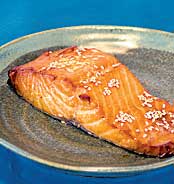Recommendations for n3 fatty acids for heart health
 Many studies show a correlation between n-3 fatty acids (FAs; aka omega-3 fatty acids) and cardiovascular disease (CVD).
Many studies show a correlation between n-3 fatty acids (FAs; aka omega-3 fatty acids) and cardiovascular disease (CVD).
Now, a review of published studies in the American Journal of Clinical Nutrition gets specific.
It concludes that increased consumption of the n-3 FAs (ie, eicosapentaenoic acid [EPA)] and docosahexaenoic acid [DHA], but not alpha-linolenic acid), either through fish or supplements or both, reduces the rates of mortality, myocardial infarction (MI; heart muscle damage from a blockage), and sudden cardiac death (SCD; death due to electrical problems in the heart).
Evidence was strongest in secondary-prevention trials (ie, patients who have had MI or SCD previously), but was also present in primary-prevention studies (ie, patients who did not have these events previously).
In an accompanying editorial, intake recommendations from the American Heart Association and several international health agencies are reported.
- For patients with known CVD: approximately 1 gram EPA+DHA per day
- For those without CVD: 400 to 500 mg EPA+DHA per day (approximately 2 servings of oily fish/week).
Despite concern about toxins in fish, proper selection and preparation of fish results in a low risk from toxins according to the editorial, especially when compared with low intakes of EPA and DHA.
7/7/06 00:23 JR